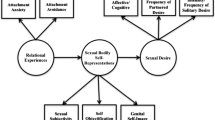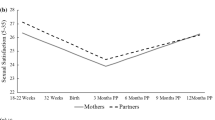Abstract
This article discusses the Stage Climbing model, a cognitive behavioral therapy based system designed to identify the beliefs and attitudes typical of different developmental life stages that may explain or identify obstacles to resolving present day relationship issues. We suggest that self-defeating beliefs and behaviors characteristic of dysfunctional couples give evidence of one or both partners operating from a stage of development or level of maturity in that aspect of the relationship that is different from what would be optimal given their presenting issues and therapeutic goals.
Similar content being viewed by others
References
Addis, J., & Bernard, M. E. (2002). Marital adjustment and irrational beliefs. Journal of Rational Emotive and Cognitive Behavior Therapy, 20, 3–13. doi:10.1023/A:1015199803099.
Baucom, D. H., Epstein, N., Sayers, S., & Sher, T. G. (1989). The role of cognitions in marital relationships: Definitional, methodological, and conceptual. Journal of Consulting and Clinical Psychology, 57, 31–38. doi:10.1037/0022-006X.57.1.31.
Broder, M. (2002). Can your relationship be saved? How to know whether to stay or go. Atascadero, CA: Impact Publishers.
Broder, M. (2012). Stage Climbing. Philadelphia, PA: MPA Publications.
Broder, M., & Goldman, A. (2004). Secrets of sexual ecstasy. New York, NY: Alpha Books.
Dryden, W. (1985). Marital therapy: The rational-emotive approach. In W. Dryden (Ed.), Marital therapy in Britain. London: Harper & Row.
Ellis, A. (1986). Rational-emotive therapy applied to relationship therapy. Journal of Rational Emotive Therapy, 4, 4–21. doi:10.1007/BF01073477.
Erikson, E. (1963). Childhood and society. New York, NY: Norton & Company, Inc.
Kohlberg, L. (1987). Child psychology and childhood education; A cognitive developmental view. United Kingdom: Longman Group.
Moller, A. T., Rabe, H. M., & Nortje, C. (2001). Dysfunctional beliefs and marital conflict in distressed and non-distressed married individuals. Journal of Rational Emotive and Cognitive Behavior Therapy, 19, 259–270. doi:10.1023/A:1012565031864.
Sullivan, C., Grant, M., & Grant, J. D. (1957). The development of interpersonal maturity: Applications to delinquency. Psychiatry Journal for the Study of Interpersonal Processes, 20, 373–385.
Author information
Authors and Affiliations
Corresponding author
Rights and permissions
About this article
Cite this article
Broder, M.S., Goldman, A. The Role of Maturity in the Cognitions that Govern Love Relationships and Sexual Satisfaction. J Rat-Emo Cognitive-Behav Ther 31, 75–83 (2013). https://doi.org/10.1007/s10942-013-0159-y
Published:
Issue Date:
DOI: https://doi.org/10.1007/s10942-013-0159-y




